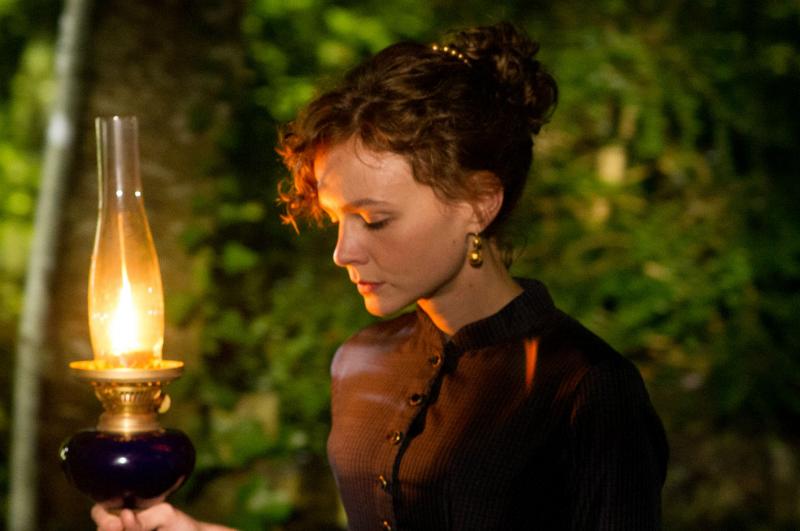DVD: Far From The Madding Crowd | reviews, news & interviews
DVD: Far From The Madding Crowd
DVD: Far From The Madding Crowd
Carey Mulligan sparkles but Thomas Vinterberg's Hardy is only a partial account

Danish director Thomas Vinterberg specialises in claustrophobic, asphyxiating atmospheres, from his breakthrough family abuse tale Festen to the more recent study of small-town paranoia, The Hunt. Moving from domestic close-up to the Wessex wide shots and cosmic panoramas of Thomas Hardy, there’s a grinding of gears, and choosing Far From The Madding Crowd as his Hardy debut, when John Schlesinger’s 1967 adaptation is so revered, seems provocative.
The Wessex countryside comes across as postcard-pretty rather than awesome and bleak
Vinterberg has cast well, and Carey Mulligan as Bathsheba Everdene brings the sort of endlessly dimpled coquettishness that ignites many a country passion, while Michael Sheen invests the character of Boldwood with a convincingly intense neurosis. Matthias Schoenaerts, as Oak, is perhaps too beautiful: it’s a wonder Bathsheba hasn’t tumbled him in the hay long before the final proposal. Vinterberg composes small, tense emotional scenes very skilfully. For me, this included Troy’s infamous sword-display seduction of Bathsheba, which here – controversially – ends on a clutch to the crotch that rather startlingly emphasises Troy’s serpentine opportunism.
Hardy’s other great character, the Wessex countryside, comes across as postcard-pretty rather than awesome and sometimes bleak, and this, along with the absence of most of the rustic crowd scenes, suggests Vinterberg’s immersion in Hardy was shallow and short-lived. His stories need both minor characters and open space in which to grow and develop, yet perhaps the most glaring contrast with Schlesinger’s version is the excision of over an hour from the running time. It’s almost as if he’s re-made Schlesinger for television, taking out the moody panoramas and chuntering rustics, to concentrate on the drama between principal characters. Despite excellent individual scenes and performances, what’s left lacks any clear aesthetic vision, and the sense of landscape and nature as agents in the story, essential in Hardy, is absent here. For once, the sum of the parts is greater than the whole, in this talented, but limited interpretation.
rating
Explore topics
Share this article
more Film
 If Only I Could Hibernate review - kids in grinding poverty in Ulaanbaatar
Mongolian director Zoljargal Purevdash's compelling debut
If Only I Could Hibernate review - kids in grinding poverty in Ulaanbaatar
Mongolian director Zoljargal Purevdash's compelling debut
 The Book of Clarence review - larky jaunt through biblical epic territory
LaKeith Stanfield is impressively watchable as the Messiah's near-neighbour
The Book of Clarence review - larky jaunt through biblical epic territory
LaKeith Stanfield is impressively watchable as the Messiah's near-neighbour
 Blu-ray/DVD: Priscilla
The disc extras smartly contextualise Sofia Coppola's eighth feature
Blu-ray/DVD: Priscilla
The disc extras smartly contextualise Sofia Coppola's eighth feature
 Back to Black review - rock biopic with a loving but soft touch
Marisa Abela evokes the genius of Amy Winehouse, with a few warts minimised
Back to Black review - rock biopic with a loving but soft touch
Marisa Abela evokes the genius of Amy Winehouse, with a few warts minimised
 Civil War review - God help America
A horrifying State of the Union address from Alex Garland
Civil War review - God help America
A horrifying State of the Union address from Alex Garland
 The Teachers' Lounge - teacher-pupil relationships under the microscope
Thoughtful, painful meditation on status, crime, and power
The Teachers' Lounge - teacher-pupil relationships under the microscope
Thoughtful, painful meditation on status, crime, and power
 Blu-ray: Happy End (Šťastný konec)
Technically brilliant black comedy hasn't aged well
Blu-ray: Happy End (Šťastný konec)
Technically brilliant black comedy hasn't aged well
 Evil Does Not Exist review - Ryusuke Hamaguchi's nuanced follow-up to 'Drive My Car'
A parable about the perils of eco-tourism with a violent twist
Evil Does Not Exist review - Ryusuke Hamaguchi's nuanced follow-up to 'Drive My Car'
A parable about the perils of eco-tourism with a violent twist
 Io Capitano review - gripping odyssey from Senegal to Italy
Matteo Garrone's Oscar-nominated drama of two teenage boys pursuing their dream
Io Capitano review - gripping odyssey from Senegal to Italy
Matteo Garrone's Oscar-nominated drama of two teenage boys pursuing their dream
 The Trouble with Jessica review - the London housing market wreaks havoc on a group of friends
Matt Winn directs a glossy cast in a black comedy that verges on farce
The Trouble with Jessica review - the London housing market wreaks havoc on a group of friends
Matt Winn directs a glossy cast in a black comedy that verges on farce
 Silver Haze review - daughters of Albion dealing with damage
Vicky Knight and Esmé Creed-Miles shine in a drama inspired by Knight's tragic past
Silver Haze review - daughters of Albion dealing with damage
Vicky Knight and Esmé Creed-Miles shine in a drama inspired by Knight's tragic past
 Mothers' Instinct review - 'Mad Women'
Sixties suburban duel veers between daftness and spooky power
Mothers' Instinct review - 'Mad Women'
Sixties suburban duel veers between daftness and spooky power

Add comment